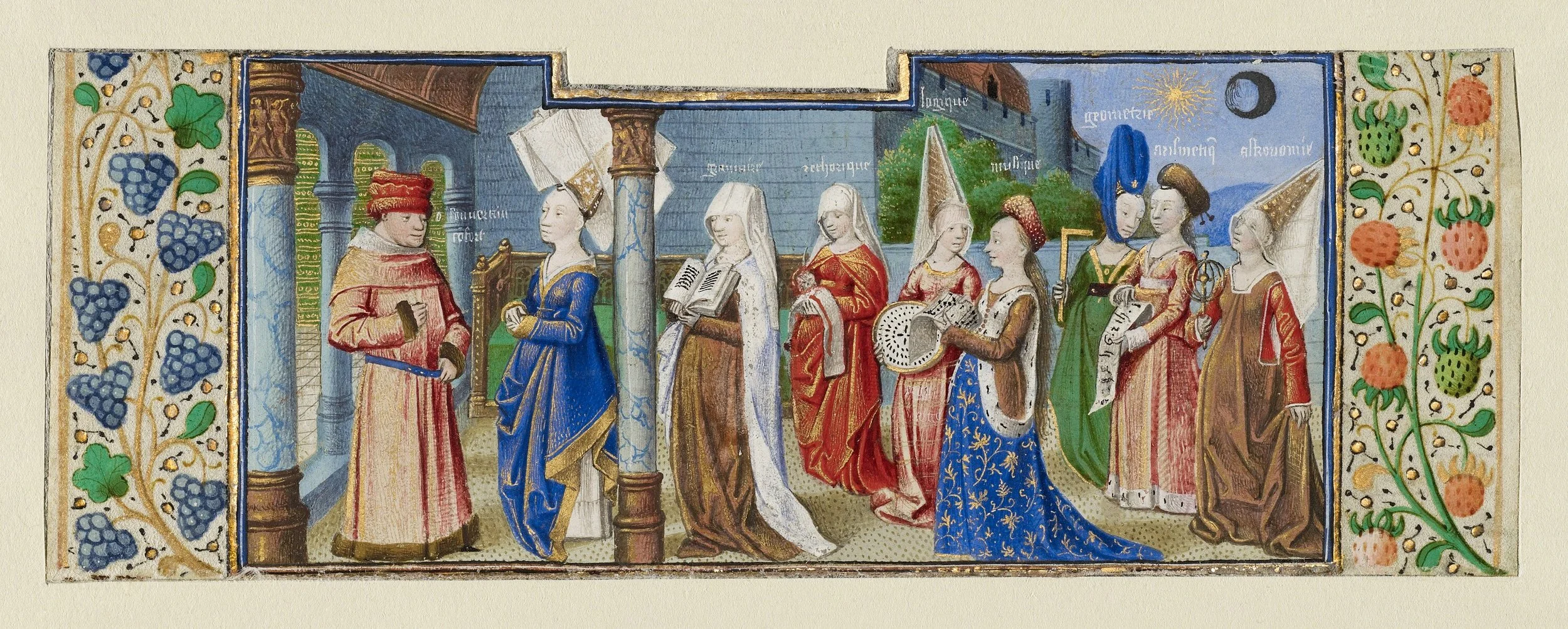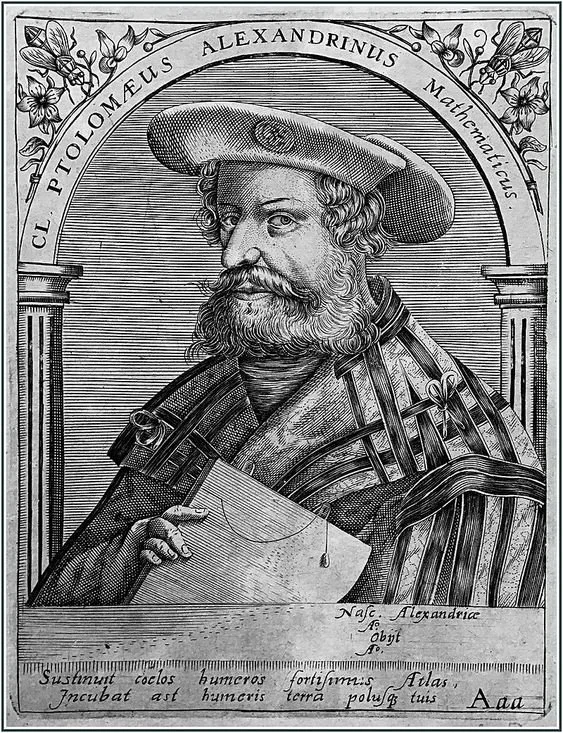History, Mythology, Science, Religion, and Astrology in between.
Astrology was created/envisioned by men, and so were other disciplines.
Why bother to its presence? Astrology is what it is. It's what has been.
Philosophy Presenting the Seven Liberal Arts to Boethius, about 1460–1470, Coëtivy Master (Henri de Vulcop?). Getty Images
The English historian Oswyn Murray once said that the difference between myth and history is that the latter aims to be the factual account of reality as experienced by human experience. The first WWI, the first man to set foot on the Moon. The myth? It's an instrument for organizing and reflecting on the human experience. Or should it be about what we could have lived? We rely on myths when we remember that Hesiod tells us that in the beginning, all that existed was Chaos. Or if we are a little more advanced when we begin to associate the myth of Persephone with the changes in the seasons: the spring beside her mother, the fields bloomed; in winter, next to the God Hades, the infertility of the soil that undermined resources.
When we attempt to investigate where we come from, history and myths come as a consequence of what came in the sort of the "beginning of our terrestrial experience": religion. In the book Hermetica, a collection of thoughts about the Universe, in the first hermetic discourse, the mythical and historical figure Hermes has an encounter with Poimandres, a kind of spiritual mind/being, a facet coming directly from ___ (god/the thing/the creator/you name it). In this dialog, Hermes asks, "I wish to learn about the things that are, to understand their nature, and to know god." Religion, humanity's major way to believe why we are alive, used to answer most of our questions when we think about the world's creation. But ever since the Age of Enlightenment, science has become the revolutionary knowledge to understand our existence based on rational thinking.
We know scientists don't wanna reach "God" through their "proven scientific" methods. In contrast, theologians want to study religions to discover what is behind reality. History, then, becomes a giant book that encompasses skeptics and believers. But, possibly, what scientists, historians, and theologians want in common is "to learn about the things that are, to understand their nature, and to get [answers]"? If history seeks facts, mythology seeks meaning, religion seeks relief, and science seeks solutions, what are we, individually and collectively, looking for by having access to all? [This is a question; answer it mentally]
In the course of history-mythology-religion-science, there have been more paradoxes than we are willing to accept. There's a lot of "we'll never really know if________." For many things, it's not even worth questioning. It's what it is; it is what has been, but what is worth exploring is what resonates between history, science, religion, and myth. Speculation?
Astrology: speculation or acknowledgment of its existence?
Speculation is a good word to introduce a knowledge-study-belief-practice that has been judged over the centuries.
Without further ado, Astrology is a mirror of the Cosmos. It's a set of theoretical studies and practical tools to measure the quality of time or life. Astrologers observe space-time (i.e., the Universe) to look for guidance on Earth. Astrology, in my view, is also about bringing "what is out there" close to us, about recognizing that "what is out there" is part of humanity, humanity is part of nature, and nature is an intrinsic part of everything that is "out there." The Mesopotamian civilization was born around 5 thousand years ago— BC —and this region was the starting point for observing and translating celestial movement. They were like "the sky, the stars, the wandered stars, they are telling us something….(else other than what [physics] will tell us later.)
So, let's not forget Astrology was a significant subject of study at European universities in the middle ages. Many famous scientists and astronomers were also astrologers before the separation of astronomy and astrology happened around the 18th century. In that sense, Astrology may take advantage of science, religion, myth, and history to explain its concepts. But Astrology is Astrology. Astrological thinking existed already before Christ and before we came out with an organized thought to make disciplines.
Claudius Ptolemy was an Alexandrian mathematician, astronomer, and geographer. Although some parts of history try to diminish, the fact is Ptolemy was an astrologer, and his book Tetrabiblos is still a huge deal in Ancient Astrology nowadays.
Astrology supposes as myth supposes as science supposes before it proves otherwise. History records what was once a supposition and, at the same time, what became a matter of fact. Astrology is always in between because it spies on the past and predicts a spoiler of the future. Sometimes astrologers get it right, sometimes we get it wrong, and so do scientists. But if there's something that Astrology doesn't imply (unlike what modernity insists), it is that we are living in a "parallel universe" (i.e. we don't believe earth is flat, fyi), that what we are doing is just bullshit.
Astrology was created/envisioned by men, and so did science.
In that case, we are all living in the same place, on Earth, and again, astrologers are only applying their own (never scientific) method to judge life, to judge our existence, and to believe in their view of life. Belief, by the way, is always welcome. After all, have you ever considered seeking a doctor without having faith that they can cure you?
The biggest mistake of those who don't like astrology or even those who don't acknowledge its relevance is not knowing that, despite not pretending to be science, there are in its foundation methods and tools. Nothing is pure theory, poetry, or excuse to blame Mercury Retrograde. There are formulas, there is math, and there are realistic geographical maps. Astrology is not an illusion. It is not an escapism tool. It's not fan-fic to laugh at the "Scorpios are dangerous" meme. Still, we have space to make things up. Is it not a human superpower to imagine? Astrology is a deep study; it is practiced, and on the contrary, it is not as simple as learning something just once, such as who the first president of the United States was [looking for the ones who think that Venus only means love]. It's a work-study that we must work hard to study. It goes beyond telling "what Mars in Taurus means." We must understand Mars' primary essence and its nature, the same for Taurus, and then apply that analysis to a particular life context, to a specific question, to a certain person who has Mars in Taurus placed, or the country founded under Mars in Taurus. If a doctor doesn't go out prescribing the same medicine for everybody who has a headache, neither of us reads a birth placement in the same way.
Astrology is done and redone many times. We practice astrology by embodying the verb itself, "to practice," and preferably in the gerund—practicing. Astrologers calculate and test like laboratories figure out and test vaccines, except we repeatedly calculate birth charts and solar returns to test the possible life outcomes. It is also reading, asking, and exchanging with other astrologers.
There are no prayers or test tubes to practice Astrology. Still, there are books, formulas, research, and faith in the oracle if we talk about horary Astrology (astrology's "tarot method"). But, again, we don't aim to be part of science field. Only those who take astrology seriously are prepared to ask silly or smart questions. However, one must be prepared to get the answer, whether it delights or hurts.
I believe historians, scientists, religious people, and astrologers share the same starting point, which is reaching an understanding of:
A population
A disease
A belief
One's life dynamic
As an astrologer, I don't wanna bear a single truth, not even what will save a single life or the whole of humanity. No knowledge or practice should promise such a thing. Neither do I want to diminish historians, mythologists, scientists, or priests. What I/we, serious astrology practitioners, want to reinforce is:
Astrology works well its own way, thank you. And we don't want to be verified by Instagram or Science to prove our practice.
At the end of the day, it's okay to cope with history, science, religion, or, yes, astrology. Or, you know what? Maybe none of them.


